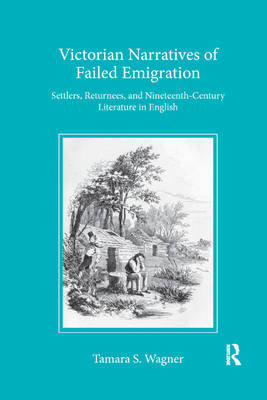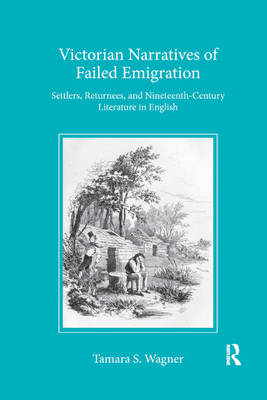
- Afhalen na 1 uur in een winkel met voorraad
- Gratis thuislevering in België vanaf € 30
- Ruim aanbod met 7 miljoen producten
- Afhalen na 1 uur in een winkel met voorraad
- Gratis thuislevering in België vanaf € 30
- Ruim aanbod met 7 miljoen producten
Zoeken
Victorian Narratives of Failed Emigration
Settlers, Returnees, and Nineteenth-Century Literature in English
Tamara S Wagner
Paperback | Engels
€ 58,45
+ 116 punten
Uitvoering
Omschrijving
In her study of the unsuccessful nineteenth-century emigrant, Tamara S. Wagner argues that failed emigration and return drive nineteenth-century writing in English in unexpected, culturally revealing ways. Wagner highlights the hitherto unexplored subgenre of anti-emigration writing that emerged as an important counter-current to a pervasive emigration propaganda machine that was pressing popular fiction into its service. The exportation of characters at the end of a novel indisputably formed a convenient narrative solution that at once mirrored and exaggerated public policies about so-called 'superfluous' or 'redundant' parts of society. Yet the very convenience of such pat endings was increasingly called into question. New starts overseas might not be so easily realizable; emigration destinations failed to live up to the inflated promises of pro-emigration rhetoric; the 'unwanted' might make a surprising reappearance. Wagner juxtaposes representations of emigration in the works of Charles Dickens, Wilkie Collins, Frances Trollope, and Charlotte Yonge with Australian, New Zealand, and Canadian settler fiction by Elizabeth Murray, Clara Cheeseman, and Susanna Moodie, offering a new literary history not just of nineteenth-century migration, but also of transoceanic exchanges and genre formation.
Specificaties
Betrokkenen
- Auteur(s):
- Uitgeverij:
Inhoud
- Aantal bladzijden:
- 286
- Taal:
- Engels
Eigenschappen
- Productcode (EAN):
- 9780367881153
- Verschijningsdatum:
- 12/12/2019
- Uitvoering:
- Paperback
- Formaat:
- Trade paperback (VS)
- Afmetingen:
- 156 mm x 233 mm
- Gewicht:
- 549 g

Alleen bij Standaard Boekhandel
+ 116 punten op je klantenkaart van Standaard Boekhandel
Beoordelingen
We publiceren alleen reviews die voldoen aan de voorwaarden voor reviews. Bekijk onze voorwaarden voor reviews.











